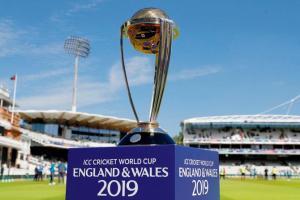The World Cup needs to remain an elite tournament and not one where teams receive an invite for trying hard; there is absolutely no evidence to show that the number of teams should increase

The World Cup on display ahead of the match between Pakistan and Bangladesh at Lord's in London on Friday. Pic /PTI
 India were exactly what the World Cup needed in 1983, a surprise winner upsetting a short-priced favourite. In 1992 Pakistan came back from the brink to scuttle England and in 1996 a pesky Sri Lanka overcame the odds to clinch victory against the upstart Australians.
India were exactly what the World Cup needed in 1983, a surprise winner upsetting a short-priced favourite. In 1992 Pakistan came back from the brink to scuttle England and in 1996 a pesky Sri Lanka overcame the odds to clinch victory against the upstart Australians.
ADVERTISEMENT
That's the disappointing aspect of the 2019 World Cup: The predictability of the final four. Australia, India and England were always favoured and the solid New Zealand line-up were most likely to be the other semi-finalist.
That's exactly the way it turned out after more than a month of scrapping.
There was the odd upset — Sri Lanka's surprise win over England gave the tournament some purpose in the last two weeks — but no outsider made the final four. This is confirmation that money can buy happiness. India, Australia and England are the three most financially stable Boards and New Zealand has for some time been one of the more efficient.
Predictable edition
The World Cup's history since 1992 provides further evidence of the tournament's predictability. Only England have failed to consistently be hovering around the mark, with 2019 being their first semi-final appearance since they were runner-up in 1992.
A semi-finalist again, Australia have won four times, been runner-up once and reached the quarter-final stage in 2011 in six tries. That dominance is great for the country but not so good for the tournament.
In the same period, India just had the blip in 2007 and can boast a victory, a runner-up medal and three [including 2019], semi-final appearances.
New Zealand have been incredibly consistent, making the semi-finals six times overall with only a runner-up medal in 2015 to show for their efforts. For an elite 50-over tournament that is too much dominance by too few teams.
Of the other major teams, West Indies and Pakistan have disappointed in the 2000's after really strong performances in the early tournaments. After a great victory in 1996 Sri Lanka have given a good account of itself in the 2000's by being runner-up twice and reaching the semi-finals in another tournament.
South Africa is an enigma. Despite producing some richly talented teams they have never made it past the semi-finals. This year's premature exit was by far the worst performance in eight tournaments and only further emphasises South Africa's failure to cope with the World Cup format.
Long way to go for B'desh
Bangladesh have played in six World Cups. Despite showing promise with a quarter-final appearance in 2015 they're still more likely to cause an occasional upset rather than any angst among knockout contenders. It should be remembered that Sri Lanka won the title on their sixth attempt.
Quality matters
Of the other reasonably new World Cup teams, only the admirable Afghanistan and the feisty Irish team have displayed the wherewithal to cause a major upset. Twenty teams in all have participated in a World Cup, with 2007 in the Caribbean being the most heavily populated with 16 teams competing. The following two tournaments — 2011 and 2015 — featured 14 teams and there was an outcry when the 2019 event was reduced to 10 sides. There's absolutely no evidence to show that number should be increased.
The World Cup needs to remain an elite tournament and not one where teams receive an invite for trying hard.
There's no doubt that the lesser teams need more encouragement to improve. The ICC should develop a pathway for those teams to test their ability against stronger opposition more regularly but financial strength and superior infrastructure will continue to favour the nations who have reached the 2019 semi-finals.
The redeeming feature of the 2019 World Cup is the best four teams at the tournament reached the knockout stage.
However, the most likely outcome is an India versus Australia final. That is a fairly predictable outcome for a tournament desperately in need of a jolt — another India 1983, Pakistan 1992 or Sri Lanka 1996. And it needs that jolt pretty soon.
 Subscribe today by clicking the link and stay updated with the latest news!" Click here!
Subscribe today by clicking the link and stay updated with the latest news!" Click here!






